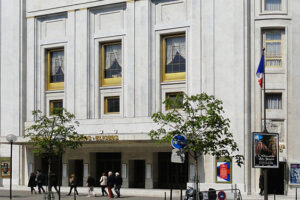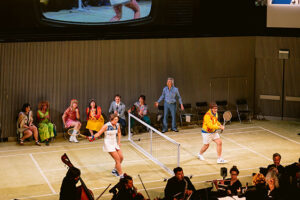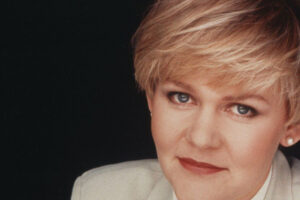

But tack on a little symphonic Beethoven and some particularly zany hosting patter from Bernadette Peters, and you start to lose focus, or at least some sense of, um, what matters mostly: letting Mozart’s oeuvre speak for itself, without the help of clever motifs, conceits, or framing devices.
The concert—which marked the start of Lincoln Center’s 51st annual, month-long salute to the music of Mozart and dashes on for another night at David Geffen Hall—was titled “The Singing Heart” and aimed to showcase the “sense of optimism” so pervasive in Mozart’s Classical- and Enlightenment-era lifetime. For artistic director Jane Moss and music director Louis Langrée, this meant devising a program that would serve as appropriate send-off to this year’s heterogeneous season, one distinguished by Schubert and a high-profile performance of Don Giovanni.
Over the course of 80 minutes, spectators were treated to the Festival Orchestra performing movements from one of Mozart’s sprightly and relatively early symphonies, the trumpet-filled “Haffner,” interspersed with (“optimistic”?) choral folk songs representing three distinct world traditions: 19th-century American shape-note hymnody, African-American slave spiritual, and Kraó Tribe song from the Amazonian forests of Brazil.
Yet because a single unexpected pairing isn’t ever enough, we also needed to honor Beethoven’s “Choral Fantasy” in C minor. And then we also needed to recognize amazon.com’s original web series, Mozart in the Jungle.
And, really, who better to perform such a tribute than the inimitable, seemingly ageless Ms. Peters herself, who I guess appears or has appeared on the show and to whom it apparently made perfect sense to come teetering out in spike heels and pink-and-gold organza last night to read from her program notes, and do that great kewpie thing she does when confronted with tongue-twisters like “amuse-bouche” and “virtuosic?”
Mostly Mozart is like that aspiring entrepreneur who knows he wants to fill a niche but didn’t seem to find one. The silver lining is that I was able to sell my co-attendee on a Bernadette Peters concert when he balked at a night of Wolfgang.
In the 18th century, explains the program notes of Mozart scholar Peter A. Hoyt, “a valuable freedom from conventional modes of thought was found—rather surprisingly—in the child.” This new liberated attitude is reflected in the frequent contributions of the Young People’s Chorus, a large choir of gifted whippersnappers, all in excellent voice.
Under the aegis of artistic director Francisco J. Núñez, these kids brought sophisticated counterpoint to the allegro spiritual “Didn’t My Lord Deliver Daniel”; they also recreated the sounds of the Amazon in “Três Cantos Natives dos Indios Kraó,” snapping fingers and moving arms to simulate a rainforest. When dozens more adorable children were brought in to sing the descant-laden “Ah vous dirai-je, maman,” an inventive use of laser lights painted a starry vision of a night sky. The effect was magical.
I wish Hoyt’s liner notes weren’t so quick to dismiss folk song as lacking in “the sophisticated procedures of Europe’s highly trained composers,” though his point is well taken: passing familiarity with folk culture during the Enlightenment period enabled Classical-period composers to take inventive risks with their symphonic works.
The concert concluded with a ravishing rendition of Beethoven’s Fantasia in C minor for piano, chorus and orchestra, a mammoth rhapsody for which the Young People’s Chorus was joined by the Concert Chorale of New York, as well as 25-year-old wunderkind pianist Kit Armstrong. Though the piece is stentorian and vintage Beethoven, it has moments of intimate spontaneity I found extremely refreshing—and even a bit unusual for the composer—with the piano often engaging in clipped musical conversation with flutes, reeds, and chorus.
An encore of “Make Our Garden Grow” from Candide brought a fitting end to a memorable evening. I’m certainly intrigued to see what else Mostly Mozart manages to bloom in the month of August.
























Comments